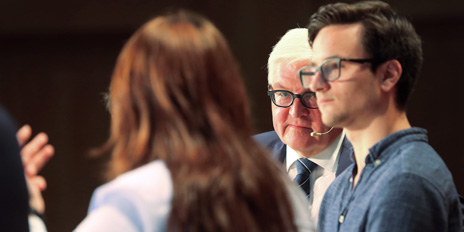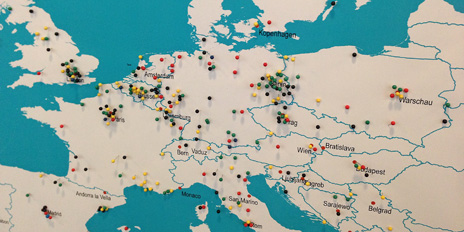Young Europeans have their say
Over 400 young people discussed the future of the great joint European project with Federal Foreign Minister Frank-Walter Steinmeier. The dialogue forum in Berlin launched a series of meetings throughout Germany.

Euroscepticism? Legitimation crisis? There is little sign of them here in the Weltsaal at the Federal Foreign Office in Berlin. Over 400 young people have come to discuss the future of Europe with Federal Foreign Minister Frank-Walter Steinmeier. Important topics are already broached before the foreign minister has even arrived. The general mood in the hall is tested: should Europe be active on matters of free trade? An overwhelming number of green voting cards are held up in the air. The picture is similar when a question is asked about stronger European integration.

It therefore appears that Europe still has fans, and it seems to remain a matter of the heart. The young men and women here have – like many others – applied on the Internet to take part in this dialogue forum. They appreciate Europe, they have grown up with it – nevertheless, it is not something they take for granted. They are concerned and see a need for discussion. And so does the foreign minister. “This Europe has already been occupied with itself for a very long time, and has evidently become less attractive as a result,” said Steinmeier to the young guests. “I want to hear what your expectations of Europe are.”
Is the European commitment in Syria strong enough?
The young people energetically take the opportunity for personal discussion with the minister. Again and again, individuals stand up and sit down in the front row – the signal that they would like to say something from the podium. Chairwoman Dunja Hayali calls them onto the stage in groups of three. Many big topical themes are raised there – in view of the time available, usually briefly and concisely, but nevertheless frankly and openly. Above all, questions of peace and security concern the young participants. They want to know whether there is still a real European option in the Ukraine crisis and whether Europe is showing too little commitment in Syria. “Of course, everything belongs in the foreign policy tool box: political pressure, economic pressure, and that also includes sanctions,” says Steinmeier with regard to Syria. “But these instruments have much too long ranges. We now need swift access, humanitarian corridors – and we have to negotiate with the conflict parties to achieve that. Foreign ministers must not come to a standstill in a state of indignation.”
In addition to the big foreign policy issues, on this morning a major role is also played by Europe’s internal appeal. The catchword “Brexit” is frequently heard, usually with a shaking of heads and concerned expressions. “Brexit has shown that things can also go backwards in Europe,” admonishes one young woman. “I miss solidarity within Europe,” says another. Many here have the impression that Europe is applying too little energy, finding too little interest – not only in the United Kingdom, but also in Germany. One young man on the podium considers it a good start that there were leading candidates for the first time at the European elections in 2014. He asks whether the Federal Government will also support that in 2019. He cannot promise that for the Federal Government, says Steinmeier, “but the Social Democrats will support it”.
“Populism and nationalism is the wrong path”
Chairwoman Dunja Hayali finally asks the foreign minister the question that concerns many in the hall. “There is an increasing shift to the right in Europe. How great are your fears?” Steinmeier believes society has a responsibility to work against that. A joint effort for Europe is enormously important here – one must not tire of working to convince people with the arguments. “Europe is not a self-supporting political product. If we do not get people to support it, it will go to the dogs. Wherever I can, I will stand up against the European attitude – one that makes me rather speechless – that believes we can use populism and nationalism to solve the problems we cannot solve with Europe. That is the wrong path.”

Meanwhile, outside the hall, a large map of Europe has been filled with coloured pins. The participants have been asked the question: where did you have your best European experience? The pins are distributed across all countries and regions; they represent memories of semesters abroad, journeys with Interrail tickets, new friendships. You cannot really fear for Europe’s future in the face of so many ties and connections – provided discussion continues. That is why the exchange will carry on: the meeting in Berlin was only the start of a series of 30 dialogue forums with citizens and representatives of the Federal Foreign Office that will be held all over Germany.

